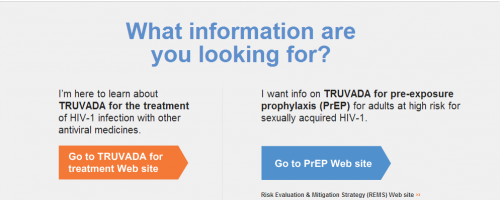Pharmaceutical drugs do an array of things to the body. They can affect mood, energy, blood flow, experiences of pain, and capacities for pleasure. Their increasing prevalence in the marketplace and home medicine cabinets suggests an addition to the old adage that ‘we are what we eat.’ Today, we are also what we take.
But embedded within cultural realities, pharmaceuticals do not simply do things to the body. Rather, they are the conduits through which the body becomes connected with and constituted through economies of both money and moral value. Pharmaceutical drugs are at once tools of medicinal healing and commodities of social and financial exchange. In understanding the implications of any particular pharmaceutical drug, then, it is pertinent to ask not only what it does, but what the pharmaceutical company is selling, to whom, and with what kind of trajectory.
Truvada is a pharmaceutical drug associated with HIV. Manufactured by Gilead, the pill has traditionally treated those already infected. Recently, however, it has also been used as an HIV preventative. Gilead claims that when taken daily, Truvada is over 90% effective in preventing HIV contraction. The preventative use for Truvada falls under the category of pre-exposure prophylaxis, or PrEP. The use of Truvada as PrEP was highlighted this month by the World Health Organization (WHO), which now recommends PrEP for all men who have sex with men, citing a projected 20-25% decrease in HIV infections among this population over 10 years[i]. WHO’s statement, released on July 11th, came in anticipation of the 20th International Aids Conference in Melbourne, Australia, currently going on this week.
Addressing the questions above about goods sold and apparent trajectory, the most obvious answer is that Gilead is selling health and wellness. They are selling it to HIV vulnerable populations. And they are selling it at widely varying financial costs, with a trajectory of reduced incidents of AIDS. In the U.S., the drug costs between $8,000-$14,000 per year—though those with insurance may be eligible for coverage—while in South Africa and India, the yearly bill for the drug is around $100. Of course, the costs also come in the form of side effects, such as liver damage, lethargy, nausea, and decreased bone density. Likely an easy trade for HIV positive patients, though maybe less so for those who have not contracted the virus.
But for the price, both financial and physical, I argue that Gilead offers more than just health and wellness; more than a future trajectory with fewer cases of AIDS internationally. In addition, Gilead offers a technology of intimacy and a re-positioning of trust.
The WHO focuses exclusively on AIDS prevention, but doctors, citizens, activists, and practitioners address the social side of medicine when they talk about PrEP. In particular, proponents construct discourses of control over sexuality and new kinds of connection, purportedly stifled or repressed when mediated through the barrier of a condom. For instance, in an interview with NPR, a New York man who uses Truvada as PrEP explains:
I didn’t fully understand what it meant to live in fear every time I had sex…And it wasn’t until about a year after I was using PREP that I had the experience of pleasurable intimacy, and realized: I’m not afraid anymore.
In ironic tension with this increased physical intimacy, is the diminished need to rely on a partner’s honesty and engage in potentially awkward and difficult conversations about sexual history[ii]. In a neoliberal move of control over the self—rather than stewardship for one another—the pill allows sexual subjects to protect themselves responsibly. This of course repositions responsibility, such that the contraction of AIDS can legitimately elicit the accusatory question: were you taking your pill regularly? This is inextricably entwined with morality. A protected body is a responsible body. A responsible self is a moral self[iii].
Interestingly, this personal responsibility is tied in with, indeed depends upon, a technological object. The moral self, here, is literally consumed.
Perhaps unsatisfyingly, I close with no clear argument for or against the production, sale, distribution, or use of PrEP. Instead, I point to the imbrication of bodies, technologies, and market economies. Truvada is not just about safety, it is about self. It is about morality. And it is, as always, about monetary exchange.
Jenny Davis is a weekly contributor for Cyborgology. Follow Jenny on Twitter @Jenny_L_Davis
[i] It is unclear why the recommendation is for men who have sex with men specifically, and not extended to the full list of “vulnerable populations” as identified by the WHO, which include people in prison, people who inject drugs, sex workers and transgender people
[ii] Of course this drug only prevents AIDS. Condoms and communication are still essential in preventing other sexually transmitted diseases.
[iii] This discourse sounds quite familiar in its mimicry of women and birth control pills.


Comments 2
Atomic Geography — July 23, 2014
Jenny, interesting post.
It may be worthwhile to explicitly consider is the ethical dimension (which you implicitly cover). Certainly ethics and morals overlap a lot of the time, but in broad strokes, the ethical is contingent on group norms, while the moral derives from an individual's norms - which the individual may construe as deriving from a transcendent source.
So as you point out in other words, "the diminished need to rely on a partner’s honesty" represents perhaps a triumph of ethics (stewardship for one another) over morality (honesty).
I think then that the production, sale and distribution of PrEP is ethical (general norm of allowing one to protect oneself) while the use of it is likely to be morally contested.